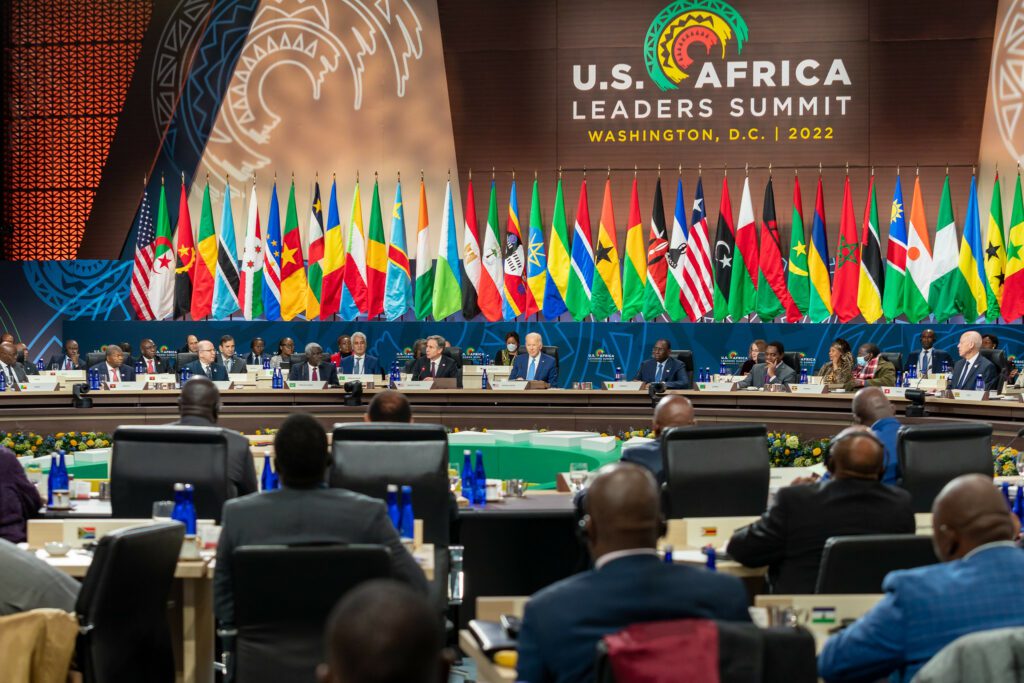Two years ago, at the second-ever U.S.-Africa Leaders’ Summit, President Joe Biden, said that he was “all in” on the continent. He told the 49 seated African leaders at the summit that, “There’s so much more we can do together and that we will do together.”
Additionally, Biden promised to visit the continent, but Africa is still waiting for that visit. At the December 2022 summit, the U.S. president also said, “Africa belongs at the table” in every conversation of global consequence. Still, reportedly he made only one phone call to an African head of state in 2023.
Besides the “commitment” to invest $55 billion in Africa over three years, takeaways from the summit can be framed as POLITICO framed it, as a gathering “featuring a large number of announcements, some new and some repackaged.”
The news outlet also noted that the summit “included some sizable financial commitments to African markets, albeit with a little creative accounting that makes it difficult for even the most assiduous U.S.-Africa policy watchers to make sense of what’s new and what is repackaged.”
Advertisement
Gleaning from the White House Fact Sheet on “Africa Partnership” after 2022, you discover POLITICO got it right. And, the recent May 2024 White House state visit by Kenya’s President William Ruto raises questions about America’s motives, intentions, and continued influence on the continent.
The state visit comes at an important moment for the U.S.-Kenya bilateral relationship. “It carries even more significance for U.S.-Africa relations more broadly.
After President Biden broke his pledge to visit Africa during his first term in office, this visit (of President William Ruto) will be viewed by many observers as a fig leaf and presented by the White House as a demonstration of the president’s continued commitment to the continent,” explained the Center for Strategic and International Studies.
According to Chatham House, an international policy think tank, President Ruto’s arrival in Washington on May 22 ends a historic drought. “No African leader has made a state visit to the U.S. since John Kufuor of Ghana in 2008—three times longer than the previous record gap, but a period that has also seen three U.S. Africa Strategies (2012, 2018 and 2022) and two U.S.–Africa Leaders’ Summits (2014 and 2022),” noted chathamhouse.org.
To some, President Biden playing host to President Ruto may seem more symbol than substance. During the three-day state visit, President Ruto received the U.S.-Kenya Business Center’s Outstanding Leaders Award from Susan Clark, President and CEO of the U.S.
Chamber of Commerce. This was preceded the night before with the U.S. president and First Lady Jill Biden welcoming the Kenyan president and his wife, Rachel, to a glamorous event filled with pomp and circumstance.
It included entertainment catering to the evangelical African leader’s love of Country Western music. “State dinners are often viewed as a tool of soft diplomacy used to court leaders of countries with whom a strong partnership is sought,” noted usatoday.com.
The three-day visit coincided with the scheduled deployment of the East African country’s initial arrival of 200 police officers to Haiti. During the visit, Kenya became the 19th nation-state to be designated a “Major Non-NATO ally” by the U.S.
The arrival of Kenyan police officers, a part of the Multinational Security Support (MSS), in Haiti was slated to begin on May 23 but was abruptly postponed without official explanation.
Sources within Kenya’s Ministry of Interior said that an exploratory team had found Haiti ill-prepared for the deployment. According to globalinitiative.net, the construction of the barracks to host the Kenyan contingent was incomplete.
Additional roadblocks included a second legal petition initiated by Ekuru Aukot, leader of Kenya’s Thirdway Alliance political party. Aukot and other Kenyan politicians are against the deployment to Haiti.
“The meddling and interference by other nations, especially the United States and its allies, remain the cause of the suffering of the people of Haiti,” Aukot said, according to a May 18 statement.
Add to that, “certain operational dimensions (the rules of engagement and the mission’s strategy) are yet in place. Other important details, such as how the multinational support mission will coordinate with the Haiti police and the Transitional Presidential Council are also missing from the picture,” explained Global Initiative.
But a larger problem may be Biden’s fight with Congress for funding. According to a recent Foreign Relations Committee press advisory: “Given the long history of U.S. involvement in Haiti with few successful results, the administration owes Congress a lot more details in a more timely manner before it gets more funding. …”
Senator James E. Risch (R-ID) may have said it all when he said: “Prior international interventions over a long, long period of time in Haiti had been dismal failures, leaving the Haitian people worse off than before.”
He told the Miami Herald, “We can’t use U.S. taxpayers dollars to support an open-ended, poorly conceived mission in a country plagued by extreme gang violence and political instability without some kind of assurances that things are going to be different this time.”
The U.S. has agreed to contribute $300 million to a multinational force, including 1,000 Kenyan police officers and others from Jamaica, the Bahamas, Antigua and Barbuda, and other countries. Multiple media outlets report the new arrival date of Kenyan troops in three weeks.
Follow @JehronMuhammad on X, formerly Twitter
Source link : https://new.finalcall.com/2024/06/03/kenya-haiti-and-americas-repackaged-africa-policies/
Author :
Publish date : 2024-06-03 14:55:00
Copyright for syndicated content belongs to the linked Source.
